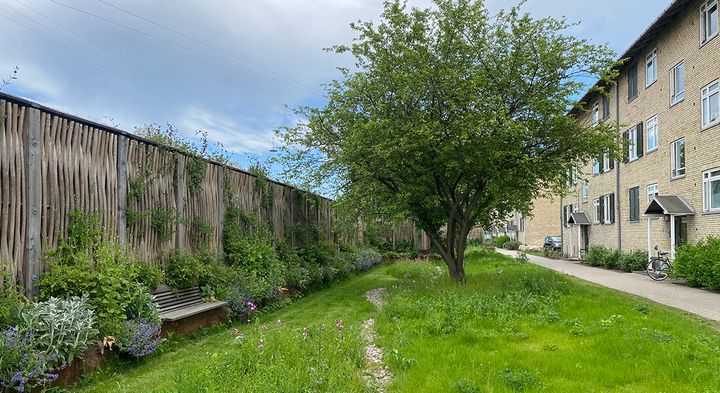Innovative stormwater solution unveiled to tackle record rainfall in Denmark
25.1.2024 09:11:08 CET | Københavns Universitet | Pressemeddelelse
RAIN WATER: Denmark faced unprecedented rainfall in 2023, breaking historical records and posing ongoing challenges with stormwater and flooding of streets and basements. Rather than resorting to expanding CO2-intensive concrete sewer networks to handle runoff, Professor Marina Bergen Jensen from the University of Copenhagen proposes to manage stormwater at its source and treating it as a valuable resource.

In response to the increasing frequency of heavy rainfall, many Danish cities are considering extensive sewer expansion projects. However, Professor Marina Bergen Jensen argues that this traditional approach is outdated. Her research focuses on implementing nature-based solutions for urban stormwater management, emphasizing the need to capture stormwater locally, near individual buildings and roadways, to alleviate stress on sewer systems and promote resilience against both flooding and drought.
"It's as if we only see one side of the climate extreme – too much water. We forget that there can also be far too little water and that water is a resource. Instead of expanding our sewers and making giant concrete tunnels and basins, which in themselves contribute to global warming, we should manage stormwater locally around individual buildings and roadways. In this way, we can become more resilient against both flooding and drought, while relieving the pressure on our sewer systems," says Professor Marina Bergen Jensen of the Department of Geosciences and Natural Resource Management.
Professor Jensen acknowledges the challenges associated with implementing nature-based solutions, known as stormwater-NbS, as they often require additional space. However, professor Jensen and her colleagues have developed an innovative technology that outperforms both traditional sewer expansions and first-generation space requiring Stormwater-NbS solutions.
A three-meter-high willow garden fence
The breakthrough invention, disguised as a three-meter-high willow garden fence, is named the "Green Climate Screen." This solution has already been successfully implemented in the Copenhagen district of Valby. The Green Climate Screen doubles as a noise barrier and manages runoff from a neighboring building's roof, redirecting the water upward into the screen instead of sending it to a sewer.
Using gravity, the system channels roof water to the top of the fence, where it is absorbed by the central material. The water then evaporates from the climate screen, providing an efficient and sustainable solution. During heavy rainfall events, excess water can be stored on an adjacent lawn, demonstrating the system's capacity to handle extreme weather conditions, exceeding the 100 y event.
"The system utilizes the potential energy of the roof water to lead the water away from the building and up into the freestanding green climate screen from which it evaporates, infiltrates or is detained on a neighbouring area surrounded by a shallow soil dyke," explains Marina Bergen Jensen.
Importantly, the Green Climate Screen achieves all this without the need for soil excavation, pumps, or concrete. This opens up new possibilities for implementing effective stormwater solutions even in confined spaces, according to Professor Jensen.
In addition to noise reduction the Green Climate Screen can provide other unique opportunities, such as linking to biodiversity, recreational areas, or urban cooling initiatives.
Widespread adoption of local systems
To bring about a substantial impact in stormwater management, Professor Jensen points to the need for widespread adoption of local systems like the Green Climate Screen. Here social housing and cooperative housing associations may provide good starting points. However, she emphasizes the need for legislative support, guidance, and financial incentives for landowners to facilitate the transition to these innovative solutions.
"One could begin by introducing it in social housing and cooperative housing associations. They are often well-organized and can take responsibility, as well as having large rooftops and green areas that could benefit from the water. If we could get that far, we will have come a long way," says Marina Bergen Jensen.
The Green Climate Screen's operational details include managing rooftop runoff through a communicating vessels principle, distributing stormwater along the screen's length, and utilizing mineral wool to absorb and evaporate water. The system is designed to withstand up to 10 years of rainfall and can handle extreme events, aligning with Copenhagen's Cloudburst Plan targeting 100 years events (90 mm in 24 hours).
Kontakter
Marina Bergen Jensen
Professor
Department og Geoscience and Natural Resource Management
University of Copenhagen
mbj@ign.ku.dk
+ 45 27 24 44 47
Michael Skov Jensen
Journalist and team coordinator
The Faculty of Science
University of Copenhagen
Mobile: + 45 93 56 58 97
msj@science.ku.dk
Følg pressemeddelelser fra Københavns Universitet
Skriv dig op her, og modtag pressemeddelelser på e-mail. Indtast din e-mail, klik på abonner, og følg instruktionerne i den udsendte e-mail.
Flere pressemeddelelser fra Københavns Universitet
Ny viden om Nordeuropas radiator: Vulkanudbrud i fortiden kan have skubbet havstrøm mod kollaps17.2.2026 10:59:19 CET | Pressemeddelelse
Ny forskning fra Københavns Universitet peger på, at vulkanudbrud under istiden kan have udløst pludselige klimaskift ved at forstyrre den Atlantiske havcirkulation (AMOC) og at temperaturen herefter kunne svinge mellem varme og kulde i tusindvis af år. Studiet bidrager med nye brikker til forståelsen af, hvad der kan få Nordeuropas radiator til at gå ned.
Hvor fandt stenalderens første bønder egentlig deres planter? Nyt studie giver svar13.2.2026 10:05:51 CET | Pressemeddelelse
Ved hjælp af avancerede maskinlærings- og klimamodeller har forskere vist, at forfædrene til afgrøder som hvede, byg og rug sandsynligvis var langt mindre udbredte i Mellemøsten for 12.000 år siden, end man hidtil har troet. Det kan betyde, at kultiveringen af de første planter og dermed landbruget opstod andre steder end hidtil antaget.
Når krisen kradser, står Danmarks frivillige klar11.2.2026 13:25:56 CET | Pressemeddelelse
En del af befolkningen står parat til at træde til, når der er krise og andre har brug for hjælp. Disse mennesker udgør en slags civilt beredskab af frivillige, mener KU-forskere fra Sociologisk Institut. Men det er ikke nødvendigvis de samme frivillige, du kender fra foreningslivet.
Graviditet ændrer kvinders reaktioner på spædbørn9.2.2026 14:28:56 CET | Pressemeddelelse
Gravide kvinder reagerer mere positivt end ikke-gravide, når de præsenteres for lydoptagelser, videoer og billeder med spædbørn. Det tyder på, at en graviditet forbereder kvinder mentalt på at håndtere signaler fra spædbørn, viser et nyt studie fra Københavns Universitet og Psykiatrisk Center København.
Algoritmer afslører nye sider af det moderne gennembruds litteratur3.2.2026 13:16:47 CET | Pressemeddelelse
Forskere fra Københavns Universitet har digitaliseret 850 romaner fra det moderne gennembrud (1870-1900) og analyseret dem ved hjælp af algoritmer og AI. De kan nu vise, at perioden gemmer på en række oversete værker, der behandler temaer som køn og religion på overraskende måder.
I vores nyhedsrum kan du læse alle vores pressemeddelelser, tilgå materiale i form af billeder og dokumenter samt finde vores kontaktoplysninger.
Besøg vores nyhedsrum